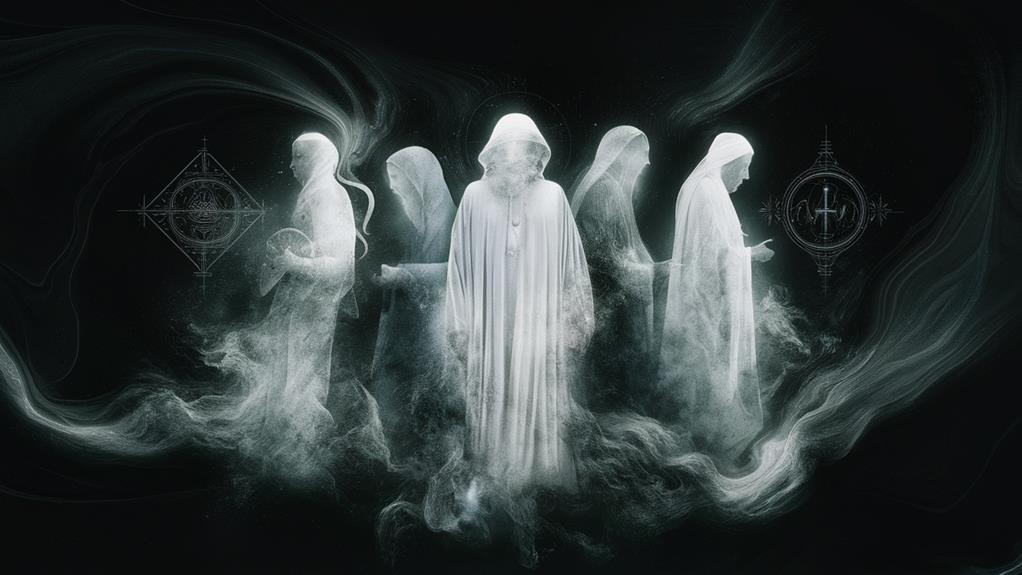Negative Theology and Apophatic Mysticism
When you first encounter negative theology, you’ll find yourself traversing a paradoxical terrain where wisdom emerges from acknowledging what cannot be known. Rather than building elaborate systems of belief, this approach invites you to strip away assumptions and certainties about the divine. You’ll discover that mystics across centuries and cultures have embraced this “way of unknowing” as a path to profound spiritual insight. While it might seem counterintuitive to seek truth through admitting ignorance, this ancient practice offers surprisingly relevant insights for modern seekers grappling with questions of meaning and transcendence.
Origins of Apophatic Thought

Where did the practice of defining God through negation first emerge? You’ll find its earliest philosophical roots in ancient Greece, where thinkers like Plato recognized the limitations of positive language when describing the divine.
Yet it’s in the works of Pseudo-Dionysius, a 6th-century Syrian monk, that you’ll discover the first systematic investigation of apophatic theology within Christian thought.
You’re connecting to a tradition that spans cultures and religions when you explore apophatic thought. In Hinduism’s Upanishads, you’ll encounter the concept of “neti neti” (not this, not that), while Buddhist philosophers developed sophisticated methods of negation to point toward ultimate reality.
The Jewish mystical tradition, particularly in medieval Kabbalah, embraced similar approaches in contemplating Ein Sof, the infinite divine. As you probe deeper, you’ll see how Islamic Sufis, especially Ibn Arabi, contributed profound insights to apophatic discourse, emphasizing the ultimate unknowability of Allah.
These diverse streams haven’t remained separate – they’ve influenced each other across centuries, creating a rich tapestry of negative theological thought that continues to challenge your assumptions about what can and can’t be said about the divine.
The Way of Unknowing
The profound lineage of apophatic thought leads naturally to its central practice: the way of unknowing. As you commence on this path, you’ll discover that true wisdom often emerges not from accumulating knowledge, but from systematically releasing your conceptual frameworks and cherished certainties.
You’re invited to embrace a radical emptying of the mind, where you’ll find that letting go of what you think you know opens doorways to deeper understanding.
In this contemplative approach, you’re called to move beyond the familiar territory of rational thought into the vast expanse of mystery. You’ll learn to rest in the spaces between thoughts, where the limitations of language and concept fall away.
This isn’t merely an intellectual exercise – it’s a transformative journey that challenges your fundamental assumptions about knowledge and being. Through this process, you’ll encounter paradox: the more you release your grip on certainty, the closer you’ll come to truth.
You’re not seeking to replace one form of knowing with another, but rather to discover a way of being that transcends the traditional boundaries between knowledge and ignorance, between self and ultimate reality.
Mystics Across Religious Traditions

Sacred mystics throughout history have embraced apophatic practices across vastly different religious traditions.
You’ll find this via negativa emerging in Christianity through figures like Meister Eckhart and St. John of the Cross, who spoke of the “dark night of the soul” as a pathway to divine union.
In Buddhism, you’ll encounter it through Nagarjuna’s teachings on emptiness and the letting go of all conceptual frameworks.
When you explore Islamic Sufism, you’ll discover mystics like Al-Junayd and Ibn Arabi, who emphasized fana – the annihilation of the self to achieve union with the divine.
Jewish Kabbalah presents you with similar themes through its concept of ayin, or divine nothingness, while Hindu Advaita Vedanta guides you toward understanding Brahman through neti neti – “not this, not that.”
You’re witnessing a remarkable convergence across cultures and epochs, where mystics have independently arrived at strikingly similar conclusions: that the ultimate reality transcends all human categories and concepts.
In each tradition, you’ll find that the path to the deepest truth often requires you to abandon what you think you know.
Language and Divine Mystery
Language itself presents a fundamental paradox in apophatic theology: you’re trying to use words to describe what words can’t capture. When you reach for language to express the divine, you’ll find your words falling short, like waves that can’t quite reach the shore.
Each attempt to name or define the ultimate mystery only highlights the distance between your expression and the ineffable truth you’re seeking to convey.
You might discover that silence becomes your most eloquent teacher, as you learn to dwell in the spaces between words. In these moments of wordless contemplation, you’ll encounter meaning that transcends conventional language.
The mystics understood this – they’d often resort to metaphor, paradox, and deliberate contradiction to point toward truths that direct statements couldn’t contain. When you say what something isn’t rather than what it is, you’re participating in an ancient tradition of negative theology that acknowledges the limitations of human speech.
Your very struggle with language becomes a sacred act, as you push against the boundaries of what can be expressed, only to find that the divine mystery lies precisely in what can’t be said.
Modern Relevance of Negative Theology

Modern spiritual seekers often find unexpected resonance in negative theology‘s ancient wisdom. You’ll discover that its emphasis on transcending limited concepts of the divine speaks powerfully to contemporary yearnings for authentic spiritual experience beyond dogmatic constraints.
In today’s world of information overload and constant noise, negative theology’s invitation to embrace mystery and unknowing offers a revitalizing counterpoint to the relentless pursuit of certainty.
You might notice how negative theology’s core insights align with postmodern critiques of language and meaning, challenging you to question your assumptions about what can truly be known or expressed. Its recognition that ultimate reality transcends human categories resonates with quantum physics’ paradoxes and the limitations of scientific knowledge.
When you’re grappling with life’s deepest questions, negative theology’s approach offers a sophisticated framework that doesn’t reduce complexity to simple answers.
In your search for meaning, you’ll find that negative theology’s emphasis on direct experience over intellectual abstraction provides an essential pathway to spiritual depth, offering freedom from the constraints of rigid belief systems while maintaining profound reverence for life’s mysteries.









